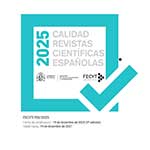Between the lack of interest in opinion formation and the desire to change the world: the participation of citizens in the 'Banda Amplia' program of TV3 in Catalonia
Abstract
In the grasp of the media literacy studies, the concept of ‘participation’ has been able to
gather a more significant attention and focus. In this regard, we could underline the 2009
European Union’s recommendations where it is possible to observe how participation is defined by this political organism in a framework of an active democracy alongside the intention to contribute into a healthier intercultural dialogue. In the same year, the EAVI (European Association for Viewers’ Interests) has also published the Study for Assessment for Media Criteria Levels, as part of a research which understood participation as a social competence, a communicative skill in the top of the Media Literacy Criteria Levels’ pyramid.
Acknowledging the importance of participation in a active citizenship, as it was put forward by Sherry Arnstein (1969) and profoundly related to the digital media literacy requirements (Perez-Tornero, 2004), this research paper aims to draw the attention under the social representations of one group of participants in the audience discussion programme Banda Ampla, from the Catalan public television TV3, in Spain. Having in mind the motivations that have been able to conduct this group of citizens to participate live in the set, we have also been interested in evaluating the levels of adhesion in the participants to the technology possibilities to interact with media. In a fifty people sample, we will describe the production settings, through an ethnographic approach, based on a non- participation observation technique. In this inquiry we have also some data which allows us to think and question how media productions are actually opening the gates to let people participate in their productions, such as in this programme broadcasted on 13th January 2011
Article download
License
In order to support the global exchange of knowledge, the journal Derecom. Derecho de la Comunicación is allowing unrestricted access to its content as from its publication in this electronic edition, and as such it is an open-access journal. The originals published in this journal are the property of the Complutense University of Madrid and any reproduction thereof in full or in part must cite the source. All content is distributed under a Creative Commons Attribution 4.0 use and distribution licence (CC BY 4.0). This circumstance must be expressly stated in these terms where necessary. You can view the summary and the complete legal text of the licence.







